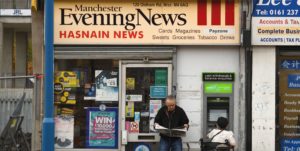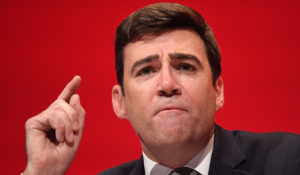“I’m a long way from Manchester so I might be missing something,” tweeted one Westminster pundit, “but it surely takes a special kind of spin-doctor genius to decide to axe the Manchester leg of HS2 during your annual conference in, err, Manchester.” Well, I was in Manchester, and as I toured around the city centre pubs on Sunday night, it began to make more sense. Or at least, I could see why — through the prism of a particular game plan that relied on a particular last-minute Hail Mary pass — it might make sense.
Rishi Sunak’s decision to cancel the Birmingham-to-Manchester leg of HS2 has been described as an embarrassing PR blunder, a spectacular snub of a host city that immediately invited the ire of mayor Andy Burnham and dozens of very sensible think tanks and highly credentialed economists.
These critics are almost certainly right. The building of a modern high-speed railway that will shorten the journey from Manchester to London to just over an hour — and free up the full-to-bursting West Coast Main Line to carry more regular and reliable local and freight services — seems to be a matter of when rather than if. Sure, we can kick it down the track for a few years, but the cost of doing so will only rise. And, in the meantime, local train services will continue to share tracks with faster intercity rail, and hordes of travellers will have to put up with the dismal services of Avanti West Coast, a company that sometimes charges us more to visit London than it would cost to fly to Italy, and then makes us stand up for two hours to drive home the humiliation.
“Make it make sense” goes the tagline of a popular online meme, and on the fact of it, cancelling this leg of HS2 just doesn’t. And yet, I think there’s a symbolism to this week’s decision that appeals to Sunak. It is the sign of a new last-gasp strategy, which involves killing what you might call Manchester-Toryism.
For most of the past 13 years, Manchester and the Conservative Party have been engaged in an awkward but mutually profitable embrace. Successive Tory governments have found the city to be a useful screen on which to project their claims to economic radicalism, starting with George Osborne’s Northern Powerhouse and reaching to Johnson’s unrealised notion of “levelling up”. Both men visited Manchester to make cliché-peppered speeches about reviving growth in the cradle of the Industrial Revolution, and both raised hopes that something might be done about the scandalous London-everywhere divide in this country.
Manchester, for its part, was a willing partner in this game. Play along, and you could get regeneration funding and devolved powers that rival cities will wait years to match. Since the late-Eighties, Manchester’s Labour leaders have become studied pragmatists in their dealings with Downing Street. In 2021, when I was researching a profile of Sir Richard Leese, Manchester’s council leader for a quarter of a century, one insider explained: “He understands the old adage that he doesn’t have allies; he has interests.”
“I always thought Richard was an incredibly practical, pragmatic, not particularly partisan person,” Osborne told me, having worked extensively with him on Greater Manchester’s pivotal 2014 devolution deal. Leese was willing to shake hands with Osborne in his office in the Treasury and then flog the chancellor over austerity just hours later to a reporter from the Manchester Evening News. The rules of the Manchester-Tory compact had been established, and everyone knew how to play by them.
Crucially, everyone’s interests seemed to be broadly aligned. Manchester needed lots of money to fix its embarrassing infrastructure, and the prospect of public investment reassured and enriched the city’s biggest private investors. Conservative governments needed to show they had a plan for the country that didn’t involve capitulating to a depressing narrative of post-imperial economic decline. And a phalanx of think-tankers loved the idea of an economic plan that might spread prosperity outside of London. The Tory-Manchester consensus was firmly in place, so firmly that holding the party’s annual conferences in deep-red Manchester actually seemed to make sense.
And then, this week, the consensus was shattered. Why?
Touring my local Manchester pubs on Sunday night — chatting to Conservative pollsters and lobbyists and gossip mongers, all astonished to be buying pints of Spanish lager for less than £4 — I gradually gleaned the answer: Dominic Cummings.
My understanding is that, after studying the Prime Minister’s dreadful polling numbers in recent months, Sunak’s close advisers called the exiled Cummings in from the cold. According to a source who works inside No. 10, the advice from Cummings was bracing: shifting the public’s perceptions of Sunak would be incredibly difficult. He made clear that only very big, very noisy moves would have any chance of persuading people that Sunak is an agent of change. No. 10 needed to pick some big public fights; the more blowback from former prime ministers and big business figures the better. Or, as one insider characterised Cummings’s advice: “Do mental stuff that proves you’re not the Establishment.”
I thought of that when I read in The Times this week that the PM’s HS2 move “has been opposed by a succession of senior Tories, including three former prime ministers — Boris Johnson, Theresa May and David Cameron”. That feels like a feature of Sunak’s strategy, not a bug.
Cummings, after all, is a long-term sceptic of HS2, having previously described it as a “disaster zone”. In one of his Substack newsletters, he wrote that his former boss Johnson had gone ahead with the project in January 2020 only after a “garbage model/graph was fed to a PM”. Cummings’s advice to Johnson, according to a later tweet, was “bin this farce”.
It looks like Cummings got through to Sunak. The recent U-turns on the Net Zero timeline and HS2 have created a lot of noise and a lot of heat, even if they still look like a middle ground between the Prime Minister’s cautious, managerial politics and what Cummings was truly gunning for. The next few months might reveal more about how much influence Cummings has around No. 10.
From the perspective of Manchester, where I write from, canning the northern extension of HS2 — the last northern leg still standing — represents a striking break from a settled consensus. As The Financial Times’s Henry Mance pointed out this week, since 2010 the country has elected three Conservative PMs, all of whom promised to build HS2 to Manchester. The years in question have not exactly been a glorious period for the British economy, but they have seen astonishing growth in Manchester, one of Europe’s fastest-growing cities. HS2 and the Northern Powerhouse Rail project (building new lines from East to West in the North) was supposed to be the oil on the fire – the bit that could finally allow our great northern cities to meaningfully narrow the gap to the capital.
Andy Burnham, who excels in moments like this, pointed to the Manchester skyline during one of his interviews this week, a panorama in which new tower blocks appear seemingly every few months. “Look at the place, the place is doing so well at the moment,” Burnham said. “And you’re going to pull the rug on us?”
The death of Manchester-Toryism — the severing of the stable quid pro quo that has existed between this city and the party it is somewhat awkwardly hosting this week — is significant. We will wait to see what Sunak promises to the North in exchange for stopping HS2 in Birmingham, but few expect the “phasing” of those plans to bring any good news soon. Cummings’s chaos politics — doing “mental stuff that proves you’re not the Establishment” — is unlikely to be compatible with the long, expensive and detail-oriented task of driving regional economic development.
“It’s a complete betrayal,” one senior political figure told me last night in Manchester as he made his way to a drinks reception for local bigwigs. “How can local leaders and businesses here ever trust what this party tells them again?”
Disclaimer
Some of the posts we share are controversial and we do not necessarily agree with them in the whole extend. Sometimes we agree with the content or part of it but we do not agree with the narration or language. Nevertheless we find them somehow interesting, valuable and/or informative or we share them, because we strongly believe in freedom of speech, free press and journalism. We strongly encourage you to have a critical approach to all the content, do your own research and analysis to build your own opinion.
We would be glad to have your feedback.
Source: UnHerd Read the original article here: https://unherd.com/




